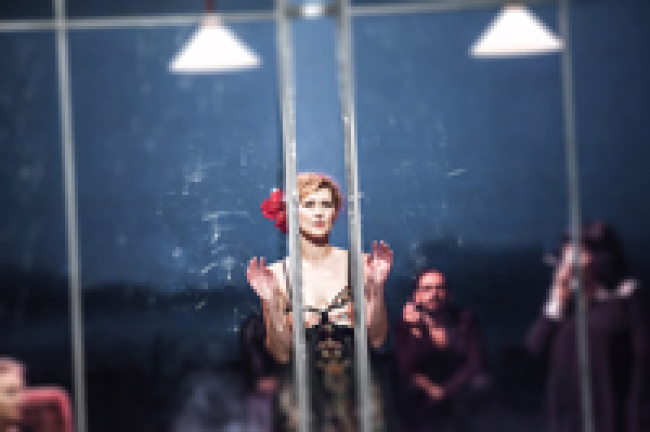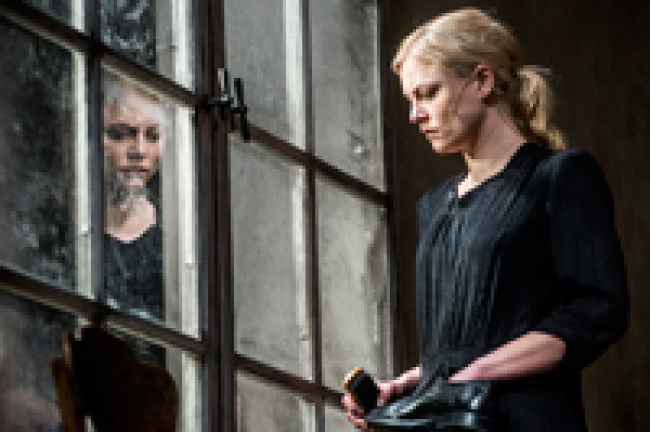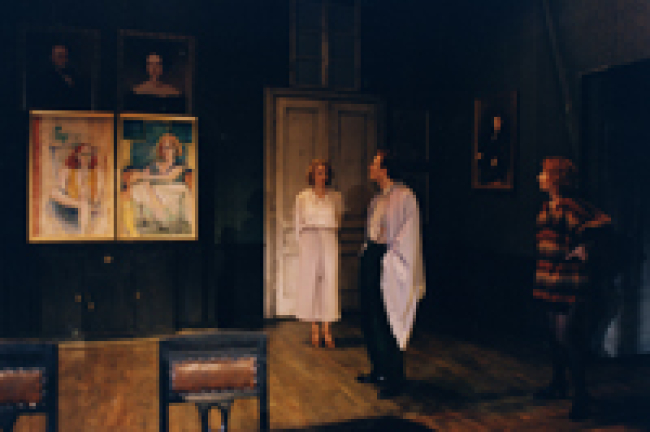Krystian Lupa stayed well clear of theatre for a long time. Born in 1943 in Silesia, a small mining town with no theatre hall of its own, his childhood days were spent dreaming up an imaginary country, even to the extent of inventing its own language. With a gift for drawing - Lupa went on to create all of his own stage sets - he entered the Krakow School of Fine Arts, aged 20. On graduating, he began studying cinema in Lodz but soon brought his studies there to an end. It was not until he was 31 years old that he took up a place at the Krakow School of Dramatic Arts in the newly-created directing department. He graduated four years later in 1978. He quickly came to the attention of his teachers, in particular, Konrad Swinarski, the most significant director in Poland at the time. He went on to become Swinarski’s assistant at the Stary Teatr in Krakow, where he directed Yvonne, Princess of Bourgogne by Gombrowicz. Krystian Lupa’s career was laid out before him, but he turned his back on it.
A group of young actors, with Krystian Lupa at the helm, decided to head off from the big towns and cities in search of a near self-sufficient lifestyle. This took them to the theatre in the town of Jelenia Gora, where they subsequently lived and worked for nine years. Prior to his departure from Krakow, Lupa saw a performance of The Dead Class by Kantor. Far from Krakow, via pieces by Witikiewicz or Gombrowicz, he “stole himself away” from Kantor’s work, in order to better detach himself from it . These years of communal artistic life were founder ones for him. Group and improvisation work, personal research, theatre as life experience, all these elements took shape there. Lupa refers to a “theatre of revelation”. We find its echo in Factory 2, in which Lupa enters into a dialogue with Warhol, a show which was performed at La Colline théâtre national in 2010 in conjunction with the Festival d’Automne.
In 1985, he temporarily returned to Krakow in order to direct La Cité du Rêve, his adaptation of Alfred Kubin’s novel The Other Side. The adaptation constituted the junction between the imaginary land of his childhood and the group experiences in Jelenia Gora. He went on stage a new version of this work, presented at the Théâtre de la Ville during the 2012 Festival d’Automne.
His return to Krakow saw him staging a multitude of works, more often than not developed in the small studio at the Stary Teatr, a favourite rehearsal space of his. He continued to draw upon repertory works - The Three Sisters by Chekhov in 1998, and Immanuel Kant, and Wittgenstein’s Nephew, both by Thomas Bernhard, in 1996. At this year’s Festival d’Automne, we will have the opportunity to see the latter performed, twenty years after its first production, with its original cast, thanks to the repertory system in existence in major theatres in Poland, giving rise to a permanent troupe and alternating shows. In parallel to this, Krystian Lupa embarked on a series of adaptations of predominantly German-language novels: Musil (Les Exaltés or ‘The Dreamers’, 1998, Esquisse de L’Homme sans qualités or ‘Sketches from the Man without Qualities’, 1990), Rilke (Malte ou Le Triptyque de l’enfant prodige or ‘Malte, or the Prodigal Son’s Triptych, 1991), and Bernhard (La Plâtrière, or ‘The Limeworks’ in1998). Dostoyevsky also figures among the writers whose work he has adapted, with The Karamazov Brothers in 1988, a production featuring students from the Krakow theatre school, the school where he himself studied. He went on to become a much demanded teacher there, imparting his knowledge to successive new generations of actors and directors in Poland today.
Parisian audiences discovered his work for the first time in 1998, via two shows presented at the Festival d’Automne: The Three Sisters by Chekhov, at the Conservatoire National Supérieure d’Art Dramatique, with third-year students from the Krakow theatre school and, at the Odéon Théâtre de l’Europe, Les Somnanbules (The Sleepwalkers), based on the work by Broch, an 8 hour-long show in two, stunning, parts. His work immerses us, to hypnotic effect, in an entire universe, and into which the audience feels itself being irrevocably drawn. Through improvisation, the writing of interior monologues and long months of rehearsals, the actors are prompted to dig deep into the core of their being, “the heart of their experiences”. Lupa’s unique brand of work is often accompanied by a density and stretching of time, in which the sound of silence becomes a spoken word in itself.
Lupa then made the decision to leave the Stary Theatr. He has returned there on subsequent occasions, but his popularity with other theatres in Krakow, and in Warsaw, as well as internationally, has made him a much sought-after director. The dialogue he started up with the work of Thomas Bernhard in La Plâtrière (The Limeworks) has continued in all its intensity - leading to ten different shows. Among them was Perturbation, staged with French actors, and presented in 2013 at La Colline théâtre national, and L’apostrophe, scène nationale de Cergy-Pontoise et du val d’Oise, in conjunction with the Festival d’Automne.
The first part of the Portrait dedicated to him by the Festival d’Automne comprises three texts by Bernhard : Place des héros (Heroes’ Square), rehearsed at the National Theatre of Lithuania in Vilnius, with a cast of Polish actors he regularly works with, Déjeuner chez Wittgenstein (Wittgenstein’s Nephew) and an adaptation of Des Arbres à abattre (Woodcutters). In the latter, we find much of Lupa’s own self and essence, the apotheosis of his head-to-head relationship with Thomas Bernhard.
“theatre as experience of life”
Jean-Pierre Thibaudat



